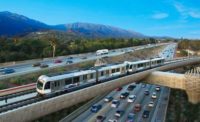The Nevada Department of Transportation kicked off the largest construction project in state history earlier this month when it named Arizona-based Kiewit Infrastructure West Co. the design-build contractor for Project NEON, the 3.7-mile widening of Interstate 15 between Sahara Avenue and the “Spaghetti Bowl” interchange in downtown Las Vegas.
Project NEON includes several components that will result in both time savings and positive environmental impacts for drivers. It will connect the carpool lanes on U.S. Highway 95 to the I-15 express lanes with a flyover bridge. The project will also create direct access carpool ramps and a new interchange called “Neon Gateway.”
Kiewit’s winning bid of $559.4 million had the highest technical score and lowest price: 5% below the runner-up, Neon Mobility Constructors, a joint-venture between Granite Construction Inc. and Skanska USA Civil West. Las Vegas Paving Corp. was second runner-up with a $600 million bid, according to NDOT.
The project also includes plans to reconstruct the Charleston Boulevard interchange and extend Grand Central Parkway over the Union Pacific Railroad tracks.
NEON is something of a legacy project for Kiewit as the company actually constructed the original I-15 in 1968, according to NDOT Public Information Officer Tony Illia. The company has completed 120 projects in Nevada since 1970.
"We've had a very successful, long-standing track record on infrastructure projects in Nevada and are both excited and eager to work on Project Neon,” said Chris Koenig, project manager at Kiewit. “Our team has put an extensive amount of time and energy in creating an innovative approach that will accelerate the construction timeline and minimize the impact on the community. While this is an incredibly complex project, we are well-prepared and ready for the challenge."
In addition to offering the lowest bid, Kiewit’s proposal included a timeline that will see the job completed 300 days quicker than the competition’s timeline. That equates to approximately $80 million time savings for taxpayers, according to Illia.
Kiewit has put protocols in place in order to adhere to its timetable.
“Each phase of the project has been meticulously planned to optimize the construction schedule.” said Koenig. “We devoted countless hours in phasing and staging the maintenance of traffic to efficiently sequence the work.”
NDOT has included incentives in the contract to encourage early completion.
“Kiewit could earn up to $20 million in early completion [bonuses],” said Illia. “But there are also penalties for going over.”
If Kiewit overshoots its Project NEON timeline, NDOT can fine the company $9,000 for every 10 minutes of freeway closures. The department can also fine Kiewit $100,000 per day that it fails to meet substantial project completion, according to Illia.
If its timetable holds true, Kiewit will complete Project NEON in late 2019.The improvements made by the project will affect commuting times, driver safety and air quality.
“This is the busiest road in the state with over 300,000 travelers daily and 25,000 lane changes per hour,” said Illia.
NDOT projects that the improvements will reduce travel delays by 28 percent, resulting in $110 million in annual savings by improving productivity. The project will also have a positive effect on air quality by reducing vehicle idling time.
In addition to improvements to carpool lane accessibility and road widening, Project NEON calls for landscape upgrades, new intelligent messaging signs and improved drainage.
NDOT also required all bidders to devise plans that will keep local streets open during construction.
Project NEON will create approximately 4,000 direct, indirect and induced local jobs in Nevada.
Kiewit has a 130-year successful track record building roads and recently completed two similar projects, the I-15 Corridor Reconstruction in Salt Lake City and the T-REX project in Denver.




